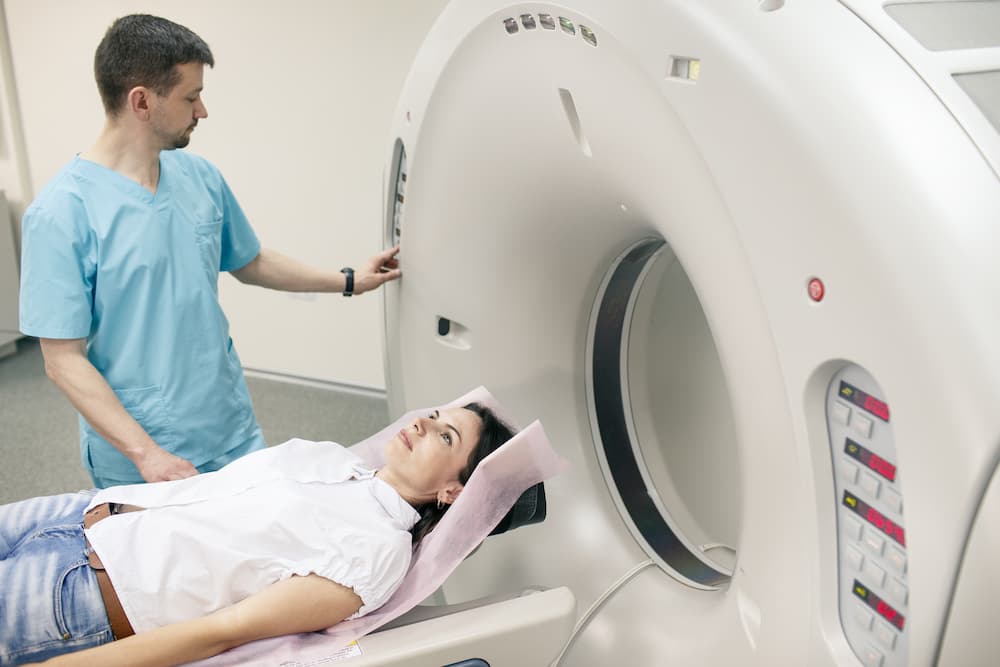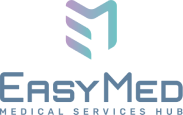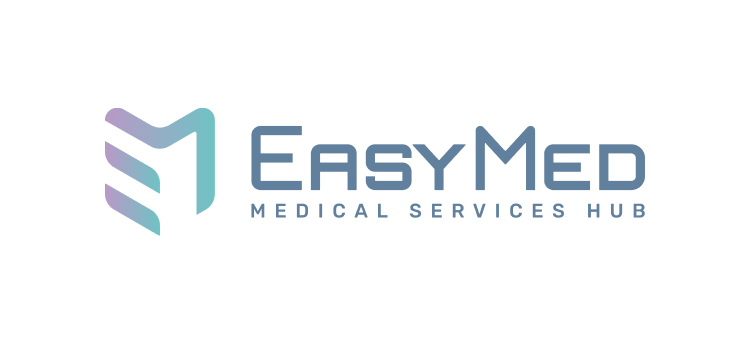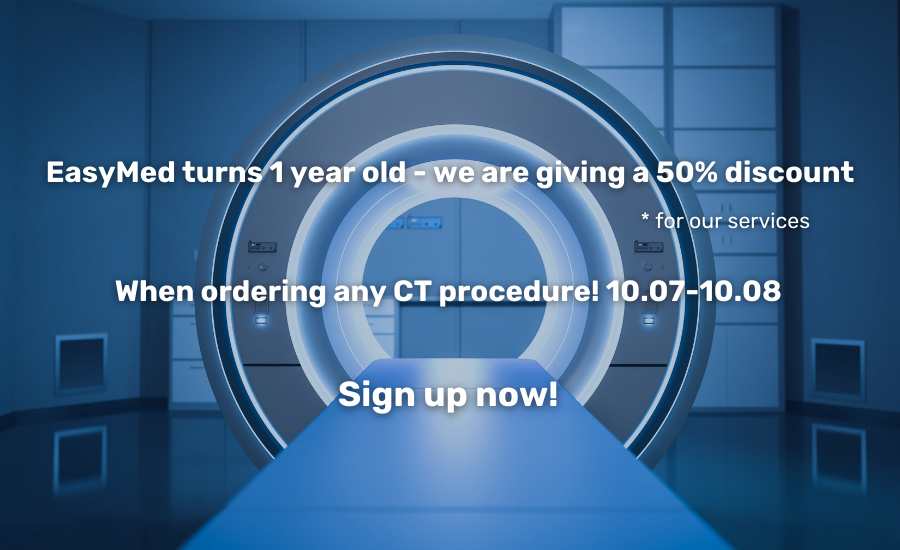
Head computed tomography
Computed tomography (CT) of the head is a high-precision diagnostic method that allows you to obtain detailed brain sections and surrounding structures. This procedure is widely used to quickly and accurately assess the condition of the brain and detect injuries, hemorrhages, tumors, and other pathologies. CT scan of the head is especially important for timely diagnosis and treatment planning.
Дополнительные процедуры:
- Лабораторный анализ мочи
- Элемент списка #2
- Элемент списка #3
CT scan of the head with EasyMed
EasyMed plays a key role in arranging the head CT procedure, helping clients find the best options for clinics in Israel, and providing support at every stage, from application to receiving results. We reduce the time interval between appointments and appointments, which is especially important for those who require urgent diagnostics.
Contacting EasyMed provides quick access to quality medical care, simplifies the diagnostic process, and ensures patient comfort and safety.
What does a CT scan of the head show?
Computed tomography (CT) of the head is widely used to diagnose a variety of diseases, including:
- Brain tumors and growths, including their size, shape, and location.
- Hemorrhages, hematomas, blood clots and other vascular pathologies.
- Inflammation and infections such as meningitis.
- Pathologies associated with strokes and ischemic attacks.
- Degenerative changes characteristic of diseases such as multiple sclerosis.
This diagnostic method provides a comprehensive analysis of brain structures, which is critical for accurate diagnosis and treatment plans.
Indications for a CT scan of the head
Computed tomography (CT) scans of the head are extremely important for diagnosing various conditions and diseases related to the brain.
Indications for a CT scan of the head may include:
- Unexplained chronic or acute headaches.
- Dizziness, fainting, and bouts of weakness.
- Problems with sight, hearing, or smell.
- Memorable disorders, seizures, signs of disorientation.
- Disorders of coordination and motor function.
- Suspicion of tumors, inflammatory processes, or vascular pathologies.
- Head or neck injuries.
Importantly! Before the CT procedure, it is important to provide the doctor with a complete medical history and a referral from the attending physician. This will ensure the accuracy of the diagnosis and allow specialists to consider the patient’s individual characteristics and medical history.
Preparation for the procedure
Preparing for a CT scan of the head involves several important steps that help ensure the safety and accuracy of the examination:
- All metal jewelry, including watches, bracelets, earrings, and piercings, must be removed before the procedure. You should also take into account the metal elements in the clothing.
- If the patient has removable medical devices, such as hearing aids, dentures, or insulin pumps, they should be removed before the procedure.
- It is important to provide the doctor with all available medical documentation, including the results of previous tests and examinations.
- The patient should notify the physician of all their current medical conditions and allergies, especially to contrast agents, if any will be used.
- If a head CT scan is performed with a contrast agent, the patient may need to temporarily abstain from food and drink for a few hours before the procedure. It is also important to notify your doctor of any allergic reactions and the condition of your kidneys.
Importantly! The patient will be additionally informed about all the necessary actions and restrictions by the EasyMed manager. This will help you prepare for the CT scan in the most efficient way and with minimal discomfort.
The process of performing a CT scan of the head
The head’s computed tomography (CT) procedure begins with the patient’s arrival at the clinic, where they register and fill out the necessary medical documents. The patient may be asked to change into special clothing and remove all metal objects.
After preparation, the patient lies down on a scanning table, slowly moving inside the CT machine, resembling a large ring tunnel. It is important to remain still during the scan. The device can make loud noises during the procedure, so the patient is often offered earplugs for comfort.
Suppose a CT scan of the head is performed using a contrast agent. In that case, it is usually given intravenously before the scan begins. This helps to visualize certain brain structures better. The entire process, including preparation, the scan, and waiting, can take up to 1.5 hours.
Usually, the scan lasts about 30 minutes, but when using contrast, the time can increase to 60 minutes. Once the head CT scan is completed, the patient can leave the clinic immediately unless there is an indication of additional follow-up.
CT scan of the head with a contrast agent
A head CT scan with a contrast agent is often used to provide a more detailed image of brain structures and blood vessels. A contrast agent injected intravenously improves tissue visualization, making it easier to detect various diseases.
A CT scan of the head with a contrast agent is used in the following cases:
- Diagnosis of brain tumors: Contrast helps clarify the size, structure, and location of tumors, including malignancies.
- Detection of inflammatory processes and infections: The procedure effectively detects diseases such as meningitis.
- Evaluation of cerebral vessels: Contrast improves visualization of the vascular system, which is critical for diagnosing aneurysms and other vascular abnormalities.
Importantly! Any allergies, especially to iodine-containing contrast agents, should be notified before a CT scan. The contrast agent is mostly safe but can cause an allergic reaction in rare cases. Most patients experience no side effects, and the contrast is quickly eliminated from the body.
Contraindications
Contraindications to computed tomography (CT) of the head include both absolute and relative limitations.
Relative contraindications:
- Claustrophobia: Uncomfortable sensations in patients with a fear of confined spaces.
- Pregnancy: Especially in the first trimester because of the potential risk to the fetus.
Absolute contraindications:
- The presence of pacemakers, neurostimulators, or other electronic devices in the patient's body.
- Severe allergy to iodine-containing contrast agents if contrast is to be used.
- Renal failure or other severe kidney disease, given that the contrast is excreted through the renal system.
Importantly! EasyMed patients receive additional advice from the manager about all the necessary precautions.
Safety of the procedure
In a head CT scan, the patient is exposed to some amount of ionizing radiation. The dose depends on the type and scope of the study, averaging between 2 and 4 millisieverts (mSv).
Despite the low radiation dose, frequent treatments may increase the risk of radiation exposure. In most cases, however, the benefits of the diagnostic information obtained by CT outweigh the potential risks.
The head CT frequency is determined individually, depending on medical indications.
Regular scans may be required to monitor chronic conditions or assess treatment dynamics.
Importantly! Patients should discuss all the risks and benefits of CT scanning and possible alternatives with their doctor to make an informed decision about the procedure. EasyMed guarantees detailed advice and information support at all stages of CT scanning.
EasyMed – Your Key to Effective Diagnosis
By choosing EasyMed for a CT procedure, you can be sure of the speed and simplicity of the process. We specialize in selecting the best medical facilities in Israel, adapting to your needs and timelines.
Cooperation with EasyMed allows you to avoid long searches for a suitable clinic and waiting in queues. We guarantee an appointment for a CT scan in the shortest possible time and professional support at all stages – from the application to the receipt and interpretation of the results. Our team of qualified specialists is always ready to provide support, including organizing additional consultations and treatment procedures if necessary.
Contacting EasyMed is a choice for quick access to high-quality medical care, reduced waiting times, and convenience at every step of the diagnostic process.
Want to make an appointment for a review?
Fill in the following details
and we will contact you as soon as possible
Faq
Frequently asked Questions
We provide personalized healthcare services. Our main goal is to provide you with a quick appointment for the necessary medical examination or consultation with a doctor.
There is no need to wait several months: with us you will get to the right specialist in the shortest possible time.
Waiting times depend on the complexity of the procedure and the doctor’s profile. We can make an appointment with some specialists within 24 hours. For complex procedures, the waiting period of which reaches several months, you will be treated with us within 2-3 weeks.
There are a number of procedures (for example, complex types of MRI) that the patient can wait about a year and a half. We can reduce this period to 3 months.
We cooperate with leading specialists in various fields, as well as with top clinics and laboratories throughout Israel and abroad.
Our doctors use the latest treatment protocols and the most advanced technologies. The clinics we work with are equipped with modern equipment that provides the most accurate results.
Our partners are experienced professionals who have earned trust due to their experience, knowledge and professionalism.
We operate in all regions of Israel. Your appointment will be scheduled at the location most convenient for you.
The cost of services depends on the complexity of the procedure and the doctor’s profile. For accurate information and cost calculation, leave your details or call: 033083020
Yes, absolutely. Confidentiality and protection of our clients' personal information is one of our key priorities. We strictly adhere to all legal and ethical standards to ensure the maximum security of your data.
Our specialists will check whether in a particular case a refund from the insurance company is due. If yes, then after completing the procedure, a receipt will be sent to the insurance agent, who, in turn, makes a request to the insurance company to return the amount due to the patient for the procedure completed.




